Special thanks to Anthony747800 for requesting this beautiful bird
Wiki
"The Hughes XF-11 was a prototype military reconnaissance aircraft, designed and flown by Howard Hughes and built by Hughes Aircraft for the United States Army Air Forces. Although 100 F-11s were ordered in 1943, only two prototypes and a mockup were completed. During the first XF-11 flight in 1946, Howard Hughes crashed the aircraft in Beverly Hills, California. The production aircraft had been canceled in May 1945, but the second prototype was completed and successfully flown in 1947. The program was extremely controversial from the beginning, leading the U.S. Senate to investigate the F-11 and the Hughes H-4 Hercules flying boat in 1947–1948."
History
"While Hughes had designed its predecessors to be fighter variants, the F-11 was intended to meet the same operational objective as the Republic XF-12 Rainbow. Specifications called for a fast, long-range, high-altitude photographic reconnaissance aircraft. A highly modified version of the earlier private-venture Hughes D-2 project, in configuration the aircraft resembled the World War II Lockheed P-38 Lightning, but was much larger and heavier. It was a tricycle-gear, twin-engine, twin-boom all-metal monoplane with a pressurized central crew nacelle, with a much larger span and much higher aspect ratio than the P-38's wing.
The XF-11 used Pratt & Whitney R-4360-31 28-cylinder radial engines. Each engine drove a pair of contra-rotating four-bladed, controllable-pitch propellers, which can increase performance and stability, at the cost of increased mechanical complexity. Due to constant problems with the contra-rotating propulsion system, the second prototype had regular single four-bladed propellers.
On the urgent recommendation of Colonel Elliott Roosevelt, who led a team surveying several reconnaissance aircraft proposals in September 1943, General Henry "Hap" Arnold, chief of the U.S. Army Air Forces, ordered 100 F-11s for delivery beginning in 1944. In this, Arnold overrode the strenuous objections of the USAAF Materiel Command, which held that Hughes did not have the industrial capacity or proven track record to deliver on his promises. (Materiel Command did succeed in mandating that the F-11 be made of aluminum, unlike its wooden D-2 predecessor.) Arnold made the decision "much against my better judgment and the advice of my staff" after consultations with the White House. The order for 100 F-11s was reduced at the end of the war to just three. Hughes delivered only one, a static test model, the other two were either destroyed in a hangar fire or in his crash.
Numerous difficulties of both a technical and managerial nature accompanied the program from the beginning. From 1946-1948, the Senate subcommittee to investigate the Defense Program, popularly known as the Truman Committee and then the Brewster Committee, investigated the F-11 and H-4 programs, leading to the famous Hughes-Roosevelt hearings in August 1947. The program cost the federal government $22 million.
"The first prototype, tail number 44-70155, piloted by Hughes, crashed on 7 July 1946 while on its maiden flight from the Hughes Aircraft Co. factory airfield at Culver City, California.
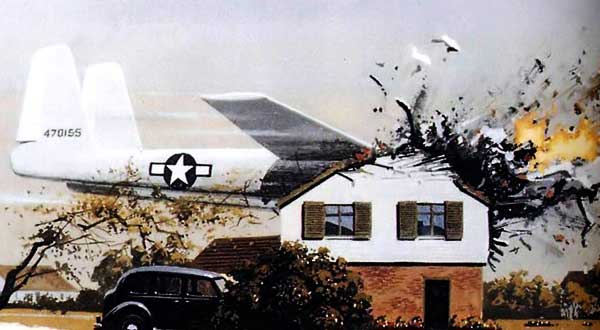
Hughes did not follow the agreed testing program and communications protocol, and remained airborne almost twice as long as planned. An hour into the flight (after onboard recording cameras had run out of film), a leak caused the right-hand propeller controls to lose their effectiveness and the rear propeller subsequently reversed its pitch, disrupting that engine's thrust, which caused the aircraft to yaw hard to the right. The USAAF account said that, "It appeared that loss of hydraulic fluid caused failure of the pitch change mechanism of right rear propeller. Mr. Hughes maintained full power of right engine and reduced that of left engine instead of trying to fly with right propeller windmilling without power. It was Wright Field's understanding that the crash was attributed to pilot error, yet Hughes successfully brought suit against Hamilton Standard for the malfunctioning counter-rotating blades in the right propeller.
Rather than feathering the propeller, Hughes performed improvised troubleshooting (including raising and lowering the gear) during which he flew away from his factory runway. Constantly losing altitude, he finally attempted to reach the golf course of the Los Angeles Country Club, but about 300 yards (270 m) short of the course, the aircraft suddenly lost altitude and clipped three houses. The third house was destroyed by fire, and Hughes was nearly killed. The crash is dramatized in the 2004 film The Aviator."
The second prototype was fitted with conventional propellers and flown by Hughes on 5 April 1947, after he had recuperated from his injuries. Initially, the USAAF had insisted that Hughes not be allowed to fly the aircraft, but after a personal appeal to Generals Ira Eaker and Carl Spaatz, he was allowed to do so against posting of $5 million in security.
This test flight was uneventful, and the aircraft proved stable and controllable at high speed. It lacked low-speed stability, however, as the ailerons were ineffective at low altitudes. When the US Army Air Forces (USAAF) evaluated it against the XF-12, testing revealed the XF-11 was harder to fly and maintain, and projected that it would be twice as expensive to build. A small production order of 98 for the Republic F-12 had been issued, but the USAAF soon chose the RB-50 Superfortress, and Northrop F-15 Reporter instead, both of which had similar long-range photo-reconnaissance capability and were available at a much lower cost.
"The Republic F-12 production order was canceled. When the United States Air Force was created as a separate service in September 1947, the XF-11 was redesignated the XR-11. The surviving XR-11 prototype arrived at Eglin Field, Florida, in December 1948 from Wright Field, Ohio, to undergo operational suitability testing through July 1949 but a production contract for 98 was canceled. The airframe was transferred to Sheppard AFB, Texas, on 26 July 1949 for use as a ground maintenance trainer by the 3750th Technical Training Wing, and was dropped from the USAF inventory in November 1949."
General Characteristic
Role:
Aerial reconnaissance
Crew:
2
Powerplant:
Pratt & Whitney R-4360-31 Wasp Major
Controls
Roll: Roll
Pitch: Pitch
Yaw: Yaw
Landing Gear: Gear
Flaps: VTOL
Airbrakes: AG1
Specifications
Spotlights
- tsampoy 5.4 years ago
- Bernkastel 5.4 years ago
General Characteristics
- Successors 1 airplane(s)
- Created On Android
- Wingspan 104.7ft (31.9m)
- Length 68.5ft (20.9m)
- Height 25.3ft (7.7m)
- Empty Weight 45,009lbs (20,416kg)
- Loaded Weight 58,525lbs (26,546kg)
Performance
- Horse Power/Weight Ratio 0.205
- Wing Loading 39.3lbs/ft2 (191.7kg/m2)
- Wing Area 1,490.6ft2 (138.5m2)
- Drag Points 12653
Parts
- Number of Parts 202
- Control Surfaces 12
- Performance Cost 967

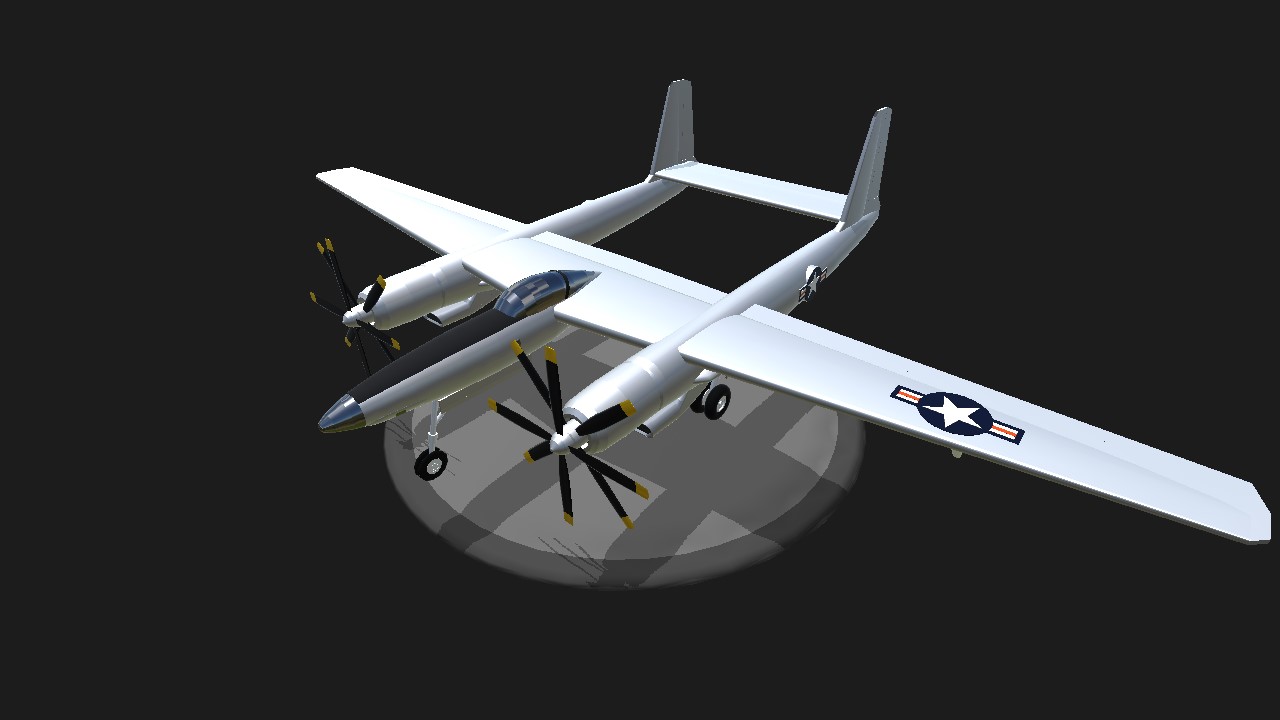
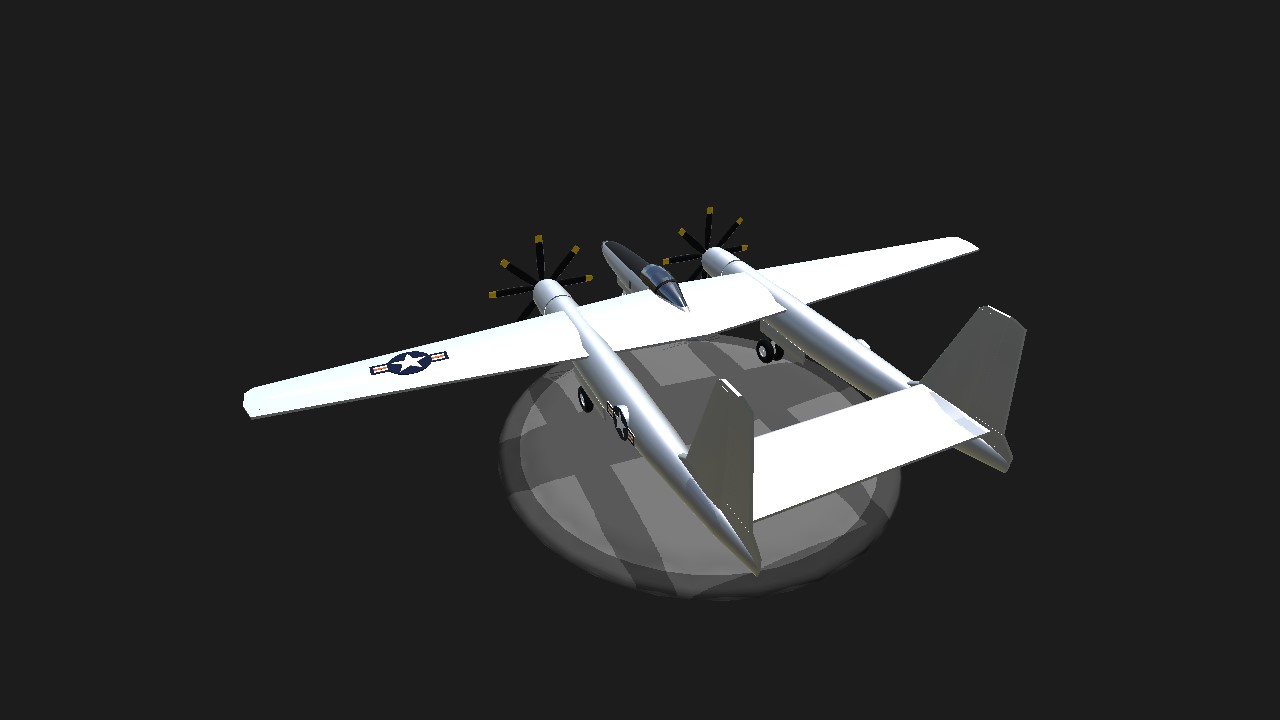
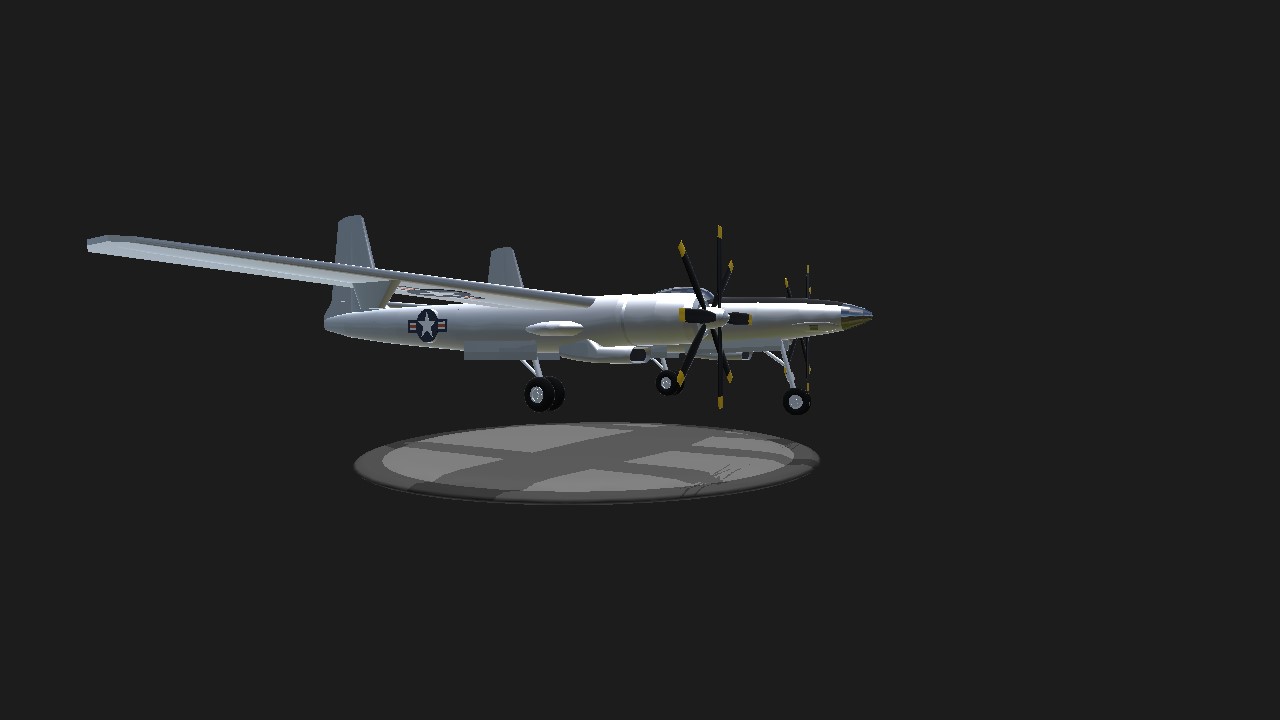
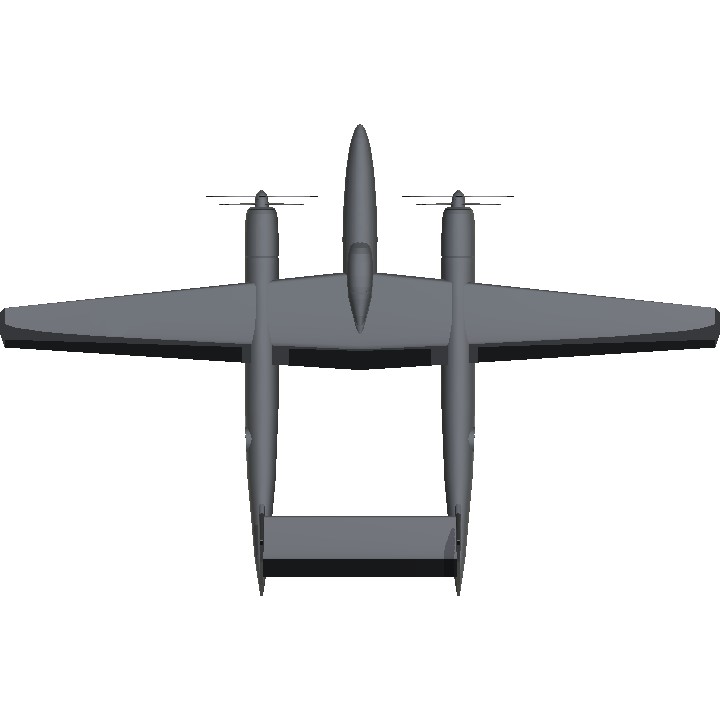
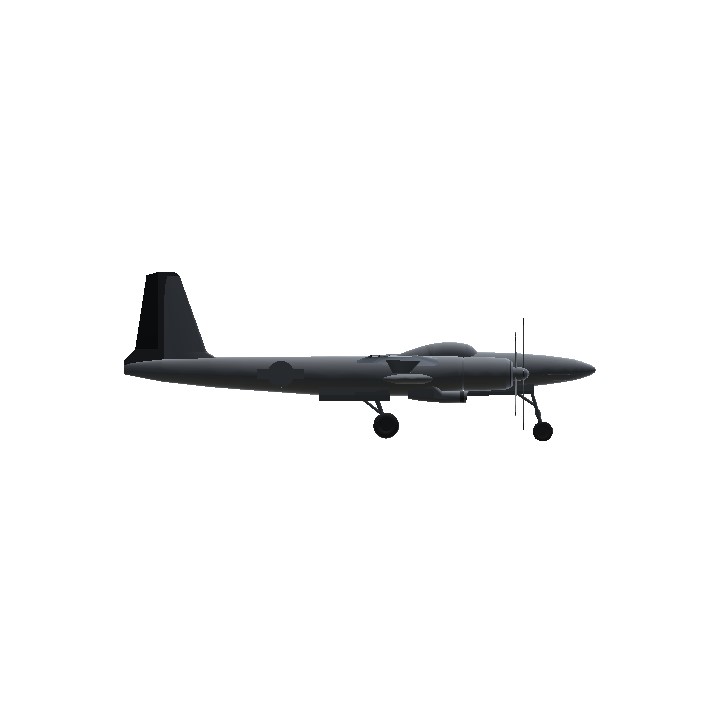
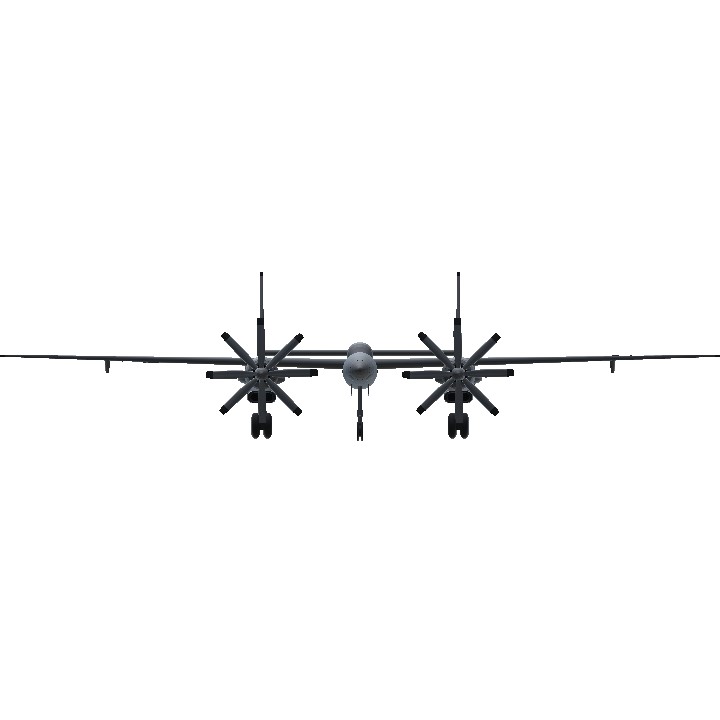
Can someone make one with all Smooth back and front
you could build a GP-5 is that the one that built it in simpleplanes did not do well
@masotan15 wc
Any plane is accepted any. And it is up to you whether it continues to a tournament after qualifying rounds
@Fpssuc can bomer accepted
What planes would you like to enter in the tournament. I'm hoping to get a couple of people to enter as well.
@masotan15 Youre welcome
But I will still do the qualifying rounds today if I get the time
Ok man thanks now I'm just waiting for more contestants
@tsampoy
@RedDevil57
@Developer9001
@switdog08
Thx
@Fpssuc yeah and I miss you
Hello masotan 15 it's been a while since I have been able to test some planes and I was wondering if you would like to participate in a tournament. The max number of planes you can enter is 10. They can be any type of planes, old or newly created. The tournament will mainly revolve around racing controlled by ai, though tie breakers are settled by dogfight. Each plane will go through a qualification round that is determined by points against a control factor plane of my choosing of average expectations. Your points received in the the qualifying round will be told to you so you can decide if you want the plane to continue or not.
Note 1 qualifying round will not be recorded and posted
Note 2 to make it easier to record data and organize please add your username and number of the plane
Thank you and can't wait to hear back have a good day
Of course!@masotan15
@AviownCorp
Thx
@HeavyC22
@Wi1dSk7
@WIZARD2017
Thx
Np, I love this plane btw. @masotan15
@Anthony747800 aaw thx
Gracias amigo eres el mejor
@masotan15 np
@Belloaka thx
Looks pretty nice
@masotan15 Oki!
@ElectricVehicle yes she only have 202 parts and thx
Very mobile friendly!
@MarinoYeet what is your account